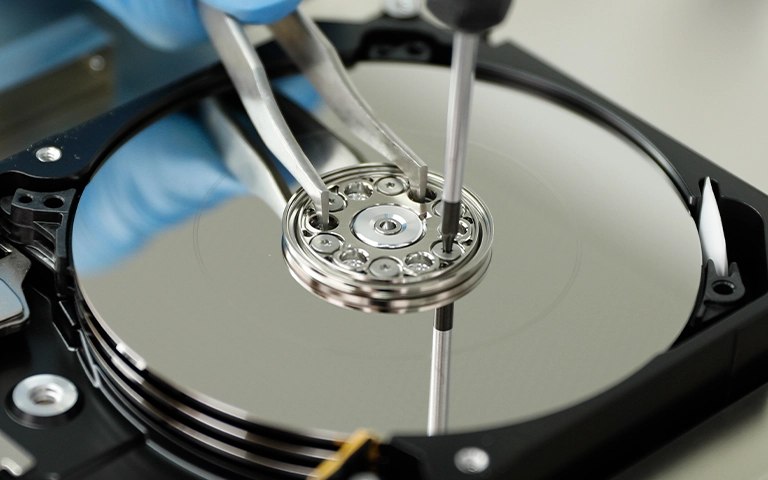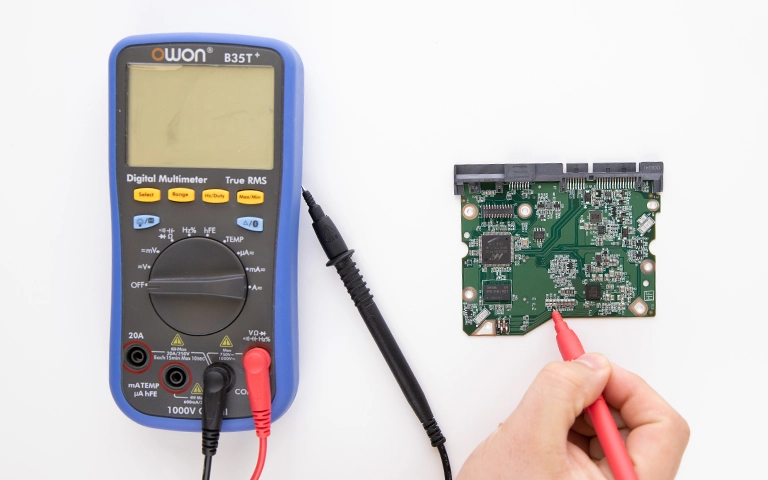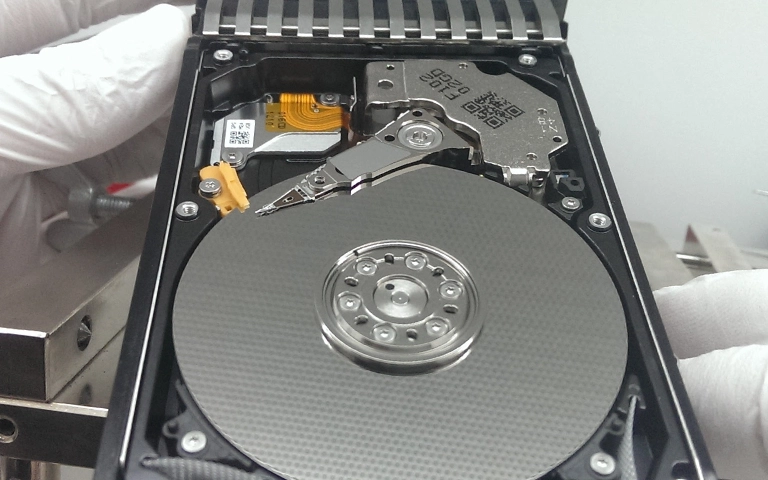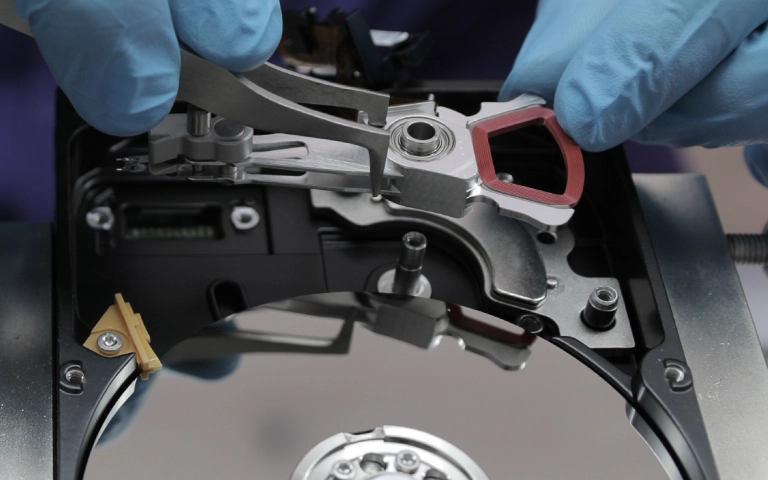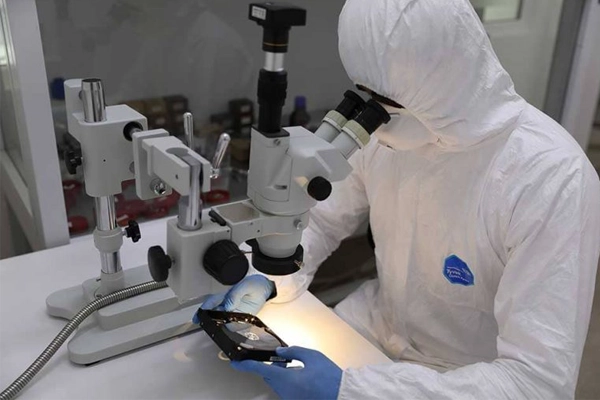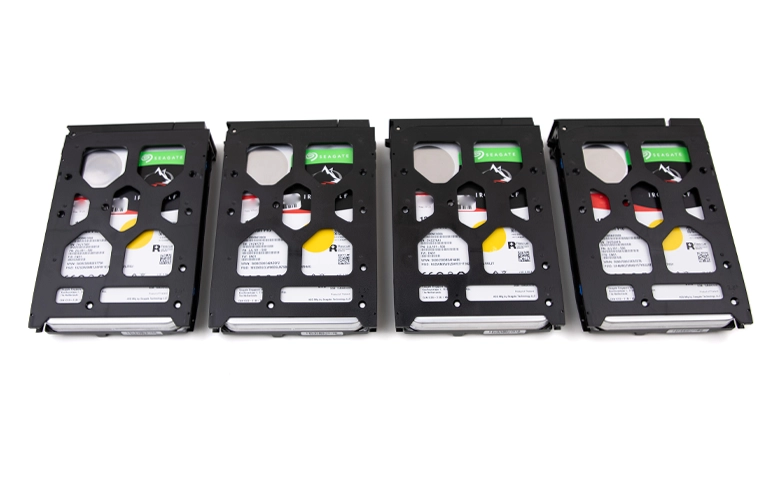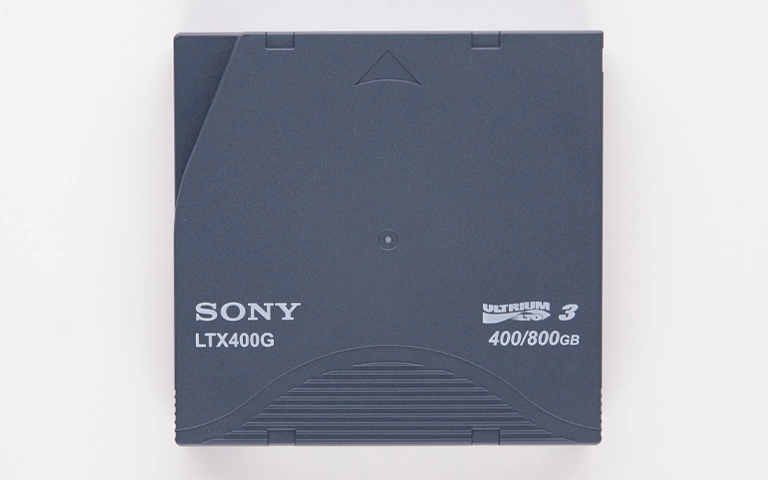A functioning hard disk drive (HDD) inside computers or external storage typically produces noticeable sound or vibration when active. If this activity is absent, resulting in silence, it indicates a potentially serious problem needing immediate attention, particularly if the hard drive is not spinning.
When a drive fails to spin, it cannot function correctly. This issue usually originates from significant hardware failures that put your stored data at risk. Identifying the possible reasons for this lack of rotation is the essential first step in diagnosing the problem and considering data recovery options.
Confirming the Drive Isn't Spinning
Before proceeding, it’s important to be sure the issue is indeed a lack of spin:
- Listen Carefully: Is the drive completely silent? There should be no humming or whirring sounds that indicate platter rotation.
- Feel for Vibration: Gently place your hand on the external drive enclosure or the computer case near an internal drive. A functioning drive produces a subtle, continuous vibration. Its absence is telling.
- Observe Indicator Lights: Does the drive’s light blink unusually, stay solid, or remain off? While lights can indicate power, they don’t guarantee the motor is spinning. The symptom ” hard drive just blinks and does not spin ” often points to electronic issues preventing motor startup.
Distinguishing from Drives That Spin But Aren't Detected
It’s important to tell the difference between a drive that isn’t spinning at all and one that spins but isn’t recognized by your computer. If you can hear or feel it spinning, the issue may involve firmware corruption, bad sectors, or a communication problem between the drive and system. These scenarios require a different recovery approach.
If your drive is spinning but not detected, you may want to check out our related post: Hard Drive Not Showing Up for more targeted guidance. This article focuses specifically on drives with no platter rotation.
What Causes a Hard Drive to Stop Spinning?
A hard drive typically stops spinning due to critical hardware failures. Common reasons include electronic faults on the Printed Circuit Board (PCB) disrupting motor power, or mechanical issues like a seized spindle motor preventing rotation. Severe read/write head stiction (heads stuck to platters) can also halt spin-up.
These serious hardware malfunctions are the main reasons a hard drive fails to spin. They almost always require professional data recovery services. Key causes include:
Printed Circuit Board (PCB) Failure
The PCB (the external circuit board) manages power and data. Damage or component failure here is a frequent reason a hard drive won’t spin.
- Electrical Damage: Power surges, shorts, or incorrect voltage can damage vital components on the PCB, interrupting power flow to the spindle motor. Such issues are common after electrical events, as detailed on our Burnt Hard Drive PCB / Power Surge Recovery page.
- Component Failure: Key chips (like the main controller, motor controller) or passive components (diodes, capacitors) can fail due to heat, age, or defects, preventing the motor from receiving the command or power to start.
- Connector Issues: Physical damage or corrosion on the drive’s power or data connectors can prevent proper power delivery.
A faulty PCB often results in a completely “dead” drive or the aforementioned “blinking light, no spin” scenario.
Seized Spindle Motor
The motor that spins the data platters at high speeds can physically seize, stopping all movement. Causes include:
- Impact Damage: A significant drop or sharp knock can damage the motor bearings or misalign the spindle assembly. If your drive has suffered physical impact, visit our article on Dropped Hard Drive Not Working for more information on what to do next.
- Bearing Wear/Failure: Over time, the high-precision bearings within the motor can degrade and eventually seize, locking the spindle.
- Internal Contamination: In rare cases, foreign debris or liquid entering the sealed drive housing could interfere with motor function. A seized motor typically results in complete silence – the drive makes no attempt to spin.
Severe Head Stiction
Usually, read/write heads stuck to the platter surface (stiction) cause beeping as the motor struggles. In severe cases, the motor might not attempt a forceful spin, causing silence. This can happen after power loss or impact. See our Hard Drive Beeping guide if it beeped before.
External Drive Specific Issues
For external hard drives, remember to check components outside the drive itself:
- Faulty Power Adapter: Ensure the adapter is working and providing the correct voltage/amperage.
- Failed Enclosure Bridge Board: The USB/Thunderbolt interface board within the external case can fail, cutting power or communication to the internal drive.
- Damaged Cable/Port: A faulty USB or power cable, or a damaged port on the computer or enclosure, could be the culprit.
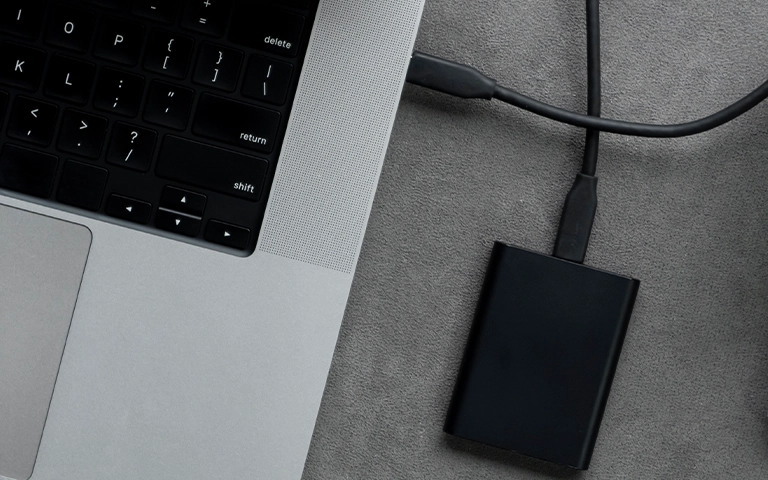
How Serious is a Non-Spinning Hard Drive?
A non-spinning hard drive signifies a critical hardware failure preventing data access. The cause (electronic or mechanical) needs expert diagnosis. Powering it on repeatedly or trying DIY fixes risks worsening PCB damage, scratching platters if heads are stuck, and making professional data recovery much harder or impossible.
The drive cannot access the data platters. Trying power-ups or amateur fixes risks making things worse:
- Compounding Electronic Damage: Cycling power on a drive with PCB issues can cause further shorts or component failures.
- Risk of Platter Damage: If the issue involves heads potentially resting on the platter, even minor unintended movements during handling or failed spin attempts could cause scratches.
- Making Recovery Harder/Impossible: Improper handling (like opening the drive) or failed repair attempts often introduce new problems that complicate or prevent professional recovery efforts.
Immediate Steps When Your Hard Drive Won't Spin
If you confirm your hard drive is not spinning, take these actions immediately:
STOP! Disconnect Power Safely
This is the most critical action. Shut down the computer properly. For external drives, unplug the power supply first, then the data cable. Do not reconnect power. Further attempts risk escalating the damage.
DO NOT Open the Drive Housing
Hard drives are sealed in cleanroom conditions. Opening the drive outside this environment guarantees contamination by dust, which will destroy the platters and heads, making data recovery impossible.
AVOID DIY Fixes & Recovery Software
Data recovery software requires a functioning, spinning drive. It cannot help if the hard drive won’t spin. Physical “tricks” found online are ineffective for these failures and highly likely to cause further damage.
Contact Professional Data Recovery Experts
PCB failure, seized motors, or stiction need special knowledge, tools, and a cleanroom. A reputable service is the only safe option for this type of failure.
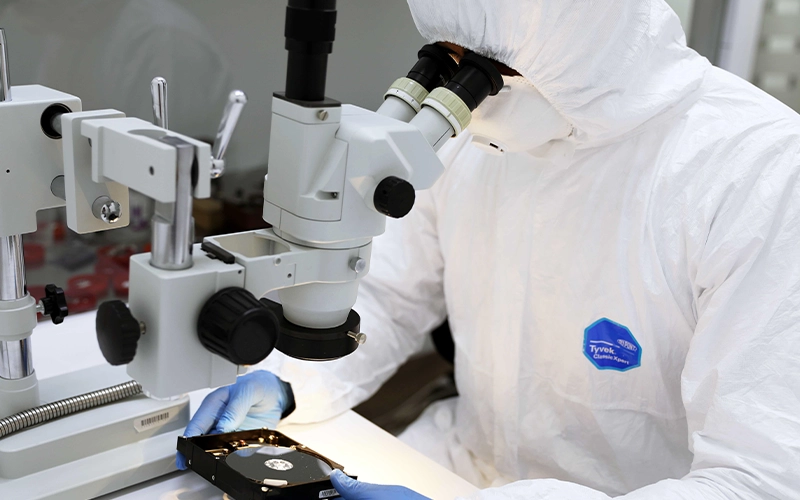
Get a Free Consultation.
Our recovery experts are ready to assess your device and guide you through the safest path to recovery. Fill out the form to get started.
"*" indicates required fields
Is Data Recovery Possible from a Non-Spinning Drive?
Yes, data recovery from a non-spinning drive is often successful if handled correctly by professionals. Techniques include PCB repair/adaptation, special cleanroom procedures for seized motors (like platter swaps), or careful head stiction resolution before applying power. Recovery depends on the specific fault.
Success depends on the fault type and requires professional help. Labs can address causes via:
- PCB Repair/Replacement: Experienced technicians can often diagnose and repair faults on the original PCB using micro-soldering. Alternatively, they can source a compatible donor PCB and transfer unique adaptive data chips from the patient board to the donor – a procedure requiring precision and expertise.
- Motor Seizure Solutions: Addressing a seized motor is complex and requires a cleanroom. Technicians may use specialized tools to attempt freeing the motor. If unsuccessful, a highly delicate platter swap might be necessary, moving the original platters into a matching, functional donor drive mechanism.
- Head Stiction Resolution: If stuck heads are preventing spin, they must be carefully lifted off the platters in a cleanroom environment using specialized tools before any power is reapplied.
Attempting these intricate repairs without the proper training, tools, and cleanroom environment will almost certainly lead to catastrophic data loss.
Why Professional Data Recovery is Essential for Non-Spinning Drives
When a drive fails to spin, DIY methods are not feasible and risky. Professional services are crucial, providing:
Accurate Diagnosis: Using special equipment to find the exact cause (PCB, motor, heads).
Component-Level Repair: Skills/tools for micro-soldering and handling sensitive PCB parts.
Certified Cleanroom: Essential for safely accessing internal parts without contamination.
Specialized Tools: Unique tools for safely handling platters, heads, and motors. (External Link Suggestion: Link to glossary explaining Hard Drive Components)
Optimized Strategy: Developing the safest plan based on the failure to maximize success.
Our process includes evaluation, a detailed report, and a firm quote before work starts. See our approach on the Hard Drive Service Page.
Industry-Leading 99% Success Rate
No hidden fees. No surprises. Just expert data recovery you can trust. We handle everything from simple file loss to extreme data recovery cases. If we can’t recover your data, no one can.
How PITS Can Assist with Non-Spinning Drive Recovery
PITS Data Recovery specializes in recovering data from all types of hard drive failures, including drives that are not spinning. Our state-of-the-art labs feature certified cleanrooms, advanced diagnostic stations, a vast inventory of donor parts, and highly experienced engineers proficient in both intricate electronic repairs and complex mechanical procedures.
If your hard drive won’t spin, let our experts provide the best chance for a successful data recovery outcome.
Frequently Asked Questions
My hard drive just blinks but doesn't spin. What does that usually mean?
Could a bad cable or power adapter cause a non-spinning external hard drive?
Will data recovery software help if my hard drive isn't spinning?
Is my data lost forever if the drive won't spin?
What's the most important first step if my hard drive isn't spinning?
Conclusion: A Silent Hard Drive Needs Expert Attention
A hard drive not spinning is a clear sign of a critical hardware malfunction, typically electronic or mechanical. While concerning, it doesn’t automatically mean your data is permanently lost. The success of recovery largely depends on your immediate actions:
- Power Off Immediately: Prevent further damage.
- Do Not Attempt DIY Fixes: Avoid causing irreversible harm.
- Contact Professionals Promptly: Engage experts with the necessary tools, environment, and expertise.
For context on various hard drive issues, see our Overview of Common Hard Drive Problems. However, for the specific and urgent problem of a non-spinning hard drive, contacting a professional data recovery service like PITS Data Recovery without delay is the effective action.

